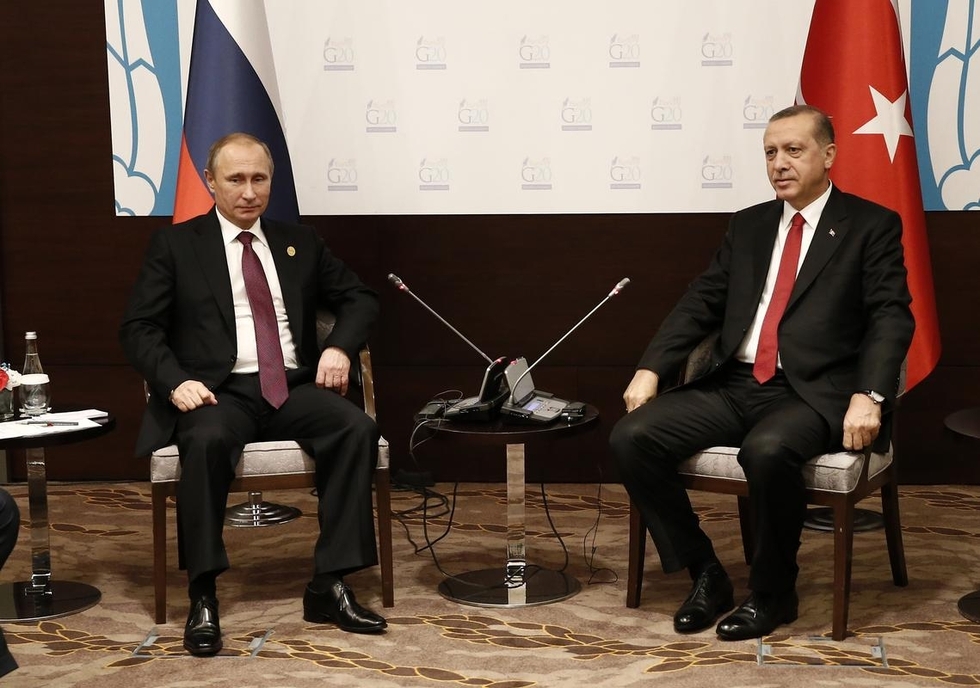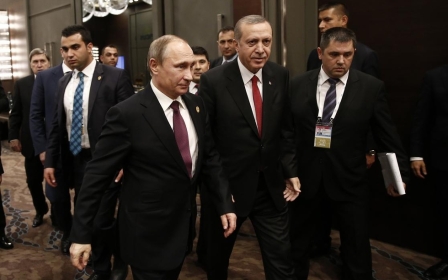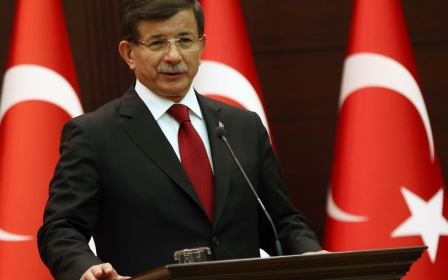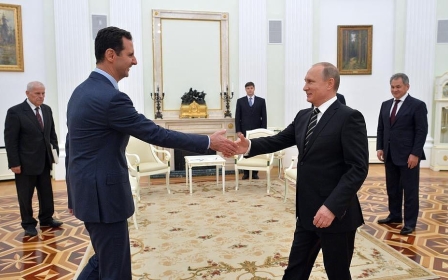Syria jet clash threatens Russia-Turkey economic ties

ISTANBUL - Russian President Vladimir Putin was quick to warn of "serious consequences" after Turkey shot down one of its planes. But short of military retaliation, the biggest weapon in Russia's arsenal is its economic might, and dependency of neighbouring countries on its vast natural gas reserves.
For Turkey, economic retaliation by Russia could plunge its economy into crisis. Turkey imports 60 percent of its gas from Russia, and has close economic ties with a large number of Russian firms. Russia is a major market for many sectors of the Turkish economy, including tourism, farming, construction and retail.
The effects of the jet attack on 24 November were almost immediate - stock markets in both countries lost value, and the Turkish Lira has plunged following a slight recovery in the last few weeks.
And in the space of just 24 hours, Russian officials started announcing retaliatory economic measures.
Both Putin and his foreign minister, Sergei Lavrov, have urged Russian tourists to avoid Turkey. Russian tourists represent the second largest group of visitors to Turkey - the country made nearly $4bn from the 4.48 million Russian tourists who visited during 2014.
A Russian news agency on Wednesday reported that poultry exports from Turkey would be stopped as of 1 December.
Umit Erol, a professor and head of business at Istanbul’s Bahcesehir University, said Russia would be the last country anyone in this region, particularly Turkey, would want to pick a fight with.
"If Russia decides to punish Turkey economically, it could inflict a lot of pain," Erol told Middle East Eye. "And this pain would not just be bilateral. Russia has a lot of clout in Central Asia and the Caucasus. Turkey could find it very difficult to do business in those places too."
Foreign investment is a particular area where Russia could hurt Turkey, according to Erol.
"Turkey needs around $50bn in various forms annually to finance its current account deficit. Capital is very picky and Turkey will face enormous difficulty to procure such financing if the perception of trouble with a giant like Russia exists,” said Erol.
"Russia wields a lot of clout and downplaying or ignoring the potential economic and financial consequences of such animosity is folly."
Natural gas a major weapon
Moscow has never been shy when it comes to cutting off energy supplies as a retaliatory tool, but in this instance it is a double-edged sword.
Turkey has become one of Russian state gas supplier Gazprom’s most valued customers ever since the crisis in Ukraine meant a drastic reduction in supplies to western European markets.
And given that energy-hungry Turkey has very few alternative options to secure natural gas, and with winter at the doorstep, even a short-term cutting off of natural gas supplies will mean that Turkey will be faced with a freezing winter.
There are doubts if Iran, Turkey’s other major natural gas supplier, has the capacity to increase output to compensate for any shortfall.
There are also doubts that it would even do so in this instance given that it is allied with Russia on the Syria issue. Another option could be Azerbaijan, but Baku’s high gas prices and potential pressure from Moscow means that option too remains unlikely.
But Russia would be the long-term loser in any energy war, said Erdal Tanas Karagol, a researcher at the economics department of the pro-Turkish government SETA Foundation. With hydrocarbon prices low, Moscow would have to think hard about the cost it is willing to endure to make the government in Ankara pay.
"The Russians are already facing a European boycott and if they lose Turkey then they have no one to export their energy to, and also no one to import from,” Karagol told MEE.
"The Turkish economy will find a way to compensate for the loss of the Russian market but Russia cannot replace Turkey.”
“We might face a tough winter if our natural gas supplies are affected but it is the Russians who will stand to lose in the long run. Our strategic geographic location is not going to change and Turkey will always remain a vital conduit for any energy project,” he said.
Agnia Grigas, a non-resident senior fellow at the Atlantic Council, believes that energy-related ramifications of this incident could have a significant effect on regional energy projects - such as the repeatedly delayed Turkish Stream pipeline, a Gazprom project that would carry Russian gas through southern Europe.
“Russia’s financial woes and economic sanctions imposed on it already made it increasingly unlikely that Turkish Stream would be built as planned, but the prospect of an official cancellation will keep Turkey more committed to Europe’s Southern Corridor project that seeks to diversify from Russian gas and bring alternative Caspian gas to the European Union,” Grigas told MEE.
* Additional reporting by Dania Akkad.
New MEE newsletter: Jerusalem Dispatch
Sign up to get the latest insights and analysis on Israel-Palestine, alongside Turkey Unpacked and other MEE newsletters
Middle East Eye delivers independent and unrivalled coverage and analysis of the Middle East, North Africa and beyond. To learn more about republishing this content and the associated fees, please fill out this form. More about MEE can be found here.




